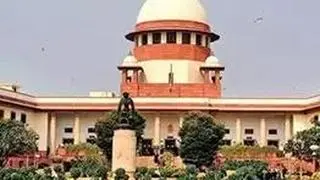In the beginning was the Congress. Then came the Kerala Congress. And then, came all the ‘bracketed’ Kerala Congress-es.
The Kerala Congress parties, lampooned as having an amoebic existence – ‘splitting to grow, growing to split’ – are an enigma in Kerala politics. Splitting, reuniting and splitting again, the original Kerala Congress, born in 1964 after breaking off from the Indian National Congress, has ensured that at least one of its factions is always in the government of the time.
The KCs mostly carry the names of their founders in the parentheses in order to distinguish each from the others — and hence, they are called the ‘bracketed’ parties. There are eight different KCs now: some of whose followers can be counted on the fingers on one hand.
Jumping blocs to surviveIn Kerala’s bipolar politics of the Congress-led United Democratic Front and the CPI(M)-led Left Democratic Front, the KCs survive and prosper by hopping the two rival camps. Take, for instance, the most recent split. On March 3, four second-rung leaders of the Kerala Congress (Mani) walked out of the party, which is part of the UDF and a senior partner in the Oommen Chandy government. The stated reason for the split: KC(M) founder KM Mani was becoming autocratic and also promoting his son and Kottayam MP, Jose K Mani, to be the next top leader. The actual reason: the four probably sensed that Mani would deny them tickets to contest the May 16 Assembly elections.
Under the leadership of Francis George — the son of KM George, who had engineered a split from the Congress Party and founded the original Kerala Congress — the group promptly floated a new party, the Kerala Congress (Democratic). Three weeks later, the LDF welcomed the KC(D) into its camp and allotted four Assembly seats to it. Never mind that only three weeks ago the quartet had their loyalties with the UDF.
Two families, same homeInterestingly, the Kerala Congress (Mani), founded in the late 1970s, is itself a ‘living together’ alliance of the ‘KM Mani Group’ and the ‘PJ Joseph Group’. The KC (Joseph), which for long had been part of the LDF, left the Left camp ahead of the 2011 Assembly elections and crossed over to the UDF. Though it theoretically merged with the KC(Mani), the UDF allots seats separately to the Joseph Group and Mani Group. Another faction, Kerala Congress (Jacob), stays as a separate party within the UDF.
Kerala Congress (Balakrishna Pillai), which fought the 2011 election as part of the UDF, is now in the LDF camp. Balakrishna Pillai’s son, film actor KB Ganesh Kumar, was the lone KC(B) member in the Assembly, and yet made a minister by Chandy. But, Pillai, the only Kerala Minister to have undergone a prison term for corruption and who is one of the founders of the UDF coalition, left the UDF in the recent past. Kumar, who won thrice as a UDF candidate, is now defending his Pathanapuram seat as an LDF nominee.
The only Kerala Congress that has joined the BJP camp is the Kerala Congress (Secular PC Thomas). Thomas, the son of former Kerala Congress stalwart PT Chacko, had broken away from the Kerala Congress (Mani). After becoming part of the NDA, he served as a Union Minister of State in the Vajpayee government.
PC George, whose KC(Secular) merged with the KC(Mani) before the 2011 elections and became part of the UDF, is now without a front to rely on. George was the Government Chief Whip, but was later expelled from the position as well as from the KC(Mani) for his loose-cannon criticism of the government, the UDF and Mani himself. He was expected to get an LDF seat, but the LDF let him down because of his ‘loose tongue’.
Christian partiesThe Kerala Congress-es are generally considered ‘Christian parties’ and their support base is the Christian-majority belt of rubber farmers, settler-farmers and planters in Kerala’s Western Ghats region, and the Church. Though splintered and housed in the three rival political fronts, the Kerala Congress-es are known to pay rich dividends to their supporters.








Comments
Comments have to be in English, and in full sentences. They cannot be abusive or personal. Please abide by our community guidelines for posting your comments.
We have migrated to a new commenting platform. If you are already a registered user of TheHindu Businessline and logged in, you may continue to engage with our articles. If you do not have an account please register and login to post comments. Users can access their older comments by logging into their accounts on Vuukle.